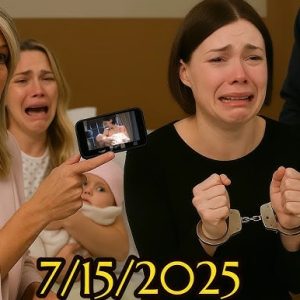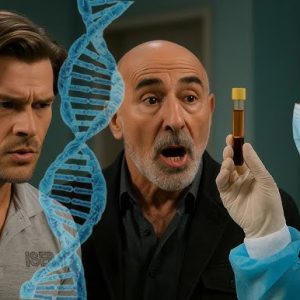The shadows creeping over Port Charles held more than just secrets—they whispered the unraveling of Willow Tate. Her descent wasn’t marked by a single devastating blow, but by a slow, suffocating collapse under the weight of betrayals, grief, and a mother’s endless longing. At first, her disquiet was quiet—a flicker of anxiety in her voice when she spoke of Wiley, the soft ache in her gaze when Amelia’s toys caught her eye. But those traces of pain grew, mutated, and birthed a version of Willow that no one recognized.

The woman who once obeyed every rule of custody and co-parenting had vanished, leaving behind a ghost with desperate eyes and shaking hands. Something in her soul had splintered the moment she met Daisy Gilmore. The child—Sasha’s child—sparked something primal in her, something broken. It wasn’t just grief for her own lost children anymore—it was obsession. And that obsession birthed a dangerous new Willow, one who no longer asked for permission to mother.
She began trespassing into the Quartermaine estate under the cover of night, stealing moments with Daisy—holding her close, whispering lullabies as if the child were her own. She always returned the baby before dawn, slipping away unseen. That is, until one night, the illusion cracked into something criminal.
Sasha sensed something was off long before she found the truth. A misplaced blanket. A whiff of unfamiliar perfume. But it was the blinking red light behind the nursery’s vent that confirmed her growing fears. A hidden camera revealed the horrifying truth: Willow, cradling Daisy, smiling with a possessive, maternal gleam. It was no longer a misunderstanding. It was madness.

And then, everything shattered.
Sasha stormed into the nursery and found Willow, baby in arms, halfway out the back door. “What the hell are you doing?!” Sasha’s voice pierced the air like a siren. Willow spun around, her expression feral. “She’s mine,” she hissed. “She was always meant to be mine.” What followed was chaos—two mothers clashing, grief against grief, pain against pain. Fueled by madness, Willow shoved Sasha with such force that her head collided with the doorframe. Sasha fell—unconscious, bleeding.
Michael burst in moments later to a scene he couldn’t comprehend—Willow standing over Sasha, clutching Daisy. “Give me the baby,” he said. Calm. Steady. But Willow’s eyes gleamed with denial. “She’s mine, Michael.” His voice didn’t waver. “No, she’s not. And you’re not okay.”
Something broke then. Willow collapsed to her knees, sobbing as Michael gently took Daisy from her arms. She didn’t resist. She didn’t flee.
But the damage was done.
Sasha was rushed to General Hospital with a concussion. Hidden camera footage and her injuries painted a picture the courts couldn’t ignore. Willow was arrested that night—charged with attempted kidnapping, assault, trespassing, and multiple custody violations. Port Charles erupted in whispers and disbelief. Those who had seen Willow fray over time knew this wasn’t a sudden break. It was the final snap of a woman pushed too far.

Nina Reeves—Willow’s estranged mother—fought desperately to reframe the tragedy not as a crime, but as a cry for help. She summoned psychiatrists, legal teams, and specialists, clinging to hope. Her pleas were heard, if only just. Willow was transferred to Ferncliffe Psychiatric Facility under the diagnosis of dissociative identity disorder. Her mind, fractured by grief, trauma, and buried abuse, had created a new persona—a mother unchained by morality or law.
But treatment came with a cost. If Willow remained a danger to herself or others, her stay would be indefinite.
Inside Ferncliffe’s sterile walls, Willow drifted between lucidity and delusion. Some days she wept with guilt. Other days, she remembered nothing. She whispered to her therapists, “I just want my kids. I’d never hurt anyone.” But Sasha’s bruises and Michael’s silence told a different story.
The Quartermaines cut ties completely. Michael gained full custody of Wiley and Amelia. Sasha healed physically, but her soul bore scars. Drew Kane, once Willow’s confidant, visited her once more through glass. “I was ready to go dark for you,” he said. “But you didn’t need someone to break the law. You needed someone to stop you.” Willow just stared, vacant.
Meanwhile, the town buzzed with rumors. Actress Katelyn MacMullen’s departure from the show loomed. Was this Willow’s tragic end or just another chapter?
Behind Ferncliffe’s walls, Willow wrote. Not apologies. Not reflections. Plans. In a notebook hidden in her mattress, her handwriting morphed across pages—some flowing and elegant, others jagged and manic. She spoke of Daisy and Wiley as if they were already hers. She imagined alternate realities where Michael begged her for forgiveness, where Sasha never existed. What she didn’t know—one of the orderlies found that notebook and sold excerpts to tabloids. Soon, Port Charles was reading her private thoughts in bold print headlines.

And then came the threats.
Sasha received cryptic notes—slipped into Amelia’s diaper bag, under her windshield wiper. “You’re not safe,” they read. One note came with a photo: Willow in her padded room, clutching a crayon drawing of Amelia. Michael acted quickly—fortified the estate, relocated the children, and filed a protection order against Willow. But the question haunted him. Why had she fallen apart? Drew began investigating, uncovering layers of Willow’s childhood trauma—neglect, foster care, unresolved abuse. The Willow they knew had been fractured long before Port Charles ever saw her smile.
Then came the fire alarm at Ferncliffe. A false alert. In the chaos, one patient slipped away—through a stairwell, past emergency exits, into the night.
Willow was gone.
An empty bed, a trail of discarded sedatives, and a town plunged into panic. Nina collapsed upon hearing the news. Michael’s security tripled. Sasha barely slept. But Willow wasn’t hiding. She was planning. Disguised, she moved between motels, forged documents, new bank accounts, burner phones. She watched Sasha. She studied Michael. She wasn’t coming to vanish—she was coming to reclaim.
Then Wiley saw her. Just a glimpse through a café window. “Daddy,” he whispered. “I saw Mommy.” Michael froze. He told no one, not even the police. He went to Nina. “I think she’s here,” he said. Nina begged for a peaceful approach. “Don’t corner her. Don’t hurt her.” Michael didn’t answer.
That night, Willow slipped into the children’s temporary residence. Avoided sensors. Entered Amelia’s room. She left a toy bunny beside her crib—a symbol, a memory. Then she stood in Wiley’s doorway, her heart splitting.
A voice broke the silence.
“I hoped you’d come,” Michael said.
Willow turned, calm. “I just wanted to see them. To feel something again.”
“I can’t let you take them,” Michael replied.
“I know.”
She raised her hands. “I won’t run. Not this time.”
Police took her away without struggle. Without violence. A mother lost to her own storm.
Weeks later, a court placed Willow in long-term psychiatric care—not Ferncliffe, but a private, secure facility arranged by Nina. No visitors. No contact. Just silence and therapy. In that facility, Willow wrote letters to her children. Not plans, not delusions. Just love. Perhaps one day, someone might read them and remember not the woman who unraveled, but the mother who once held them with all the tenderness in the world.
In Port Charles, life moved on. But no one truly forgot.





